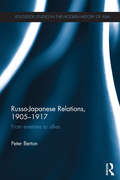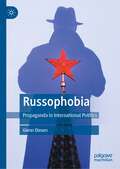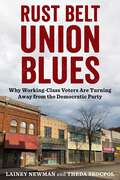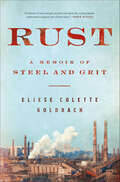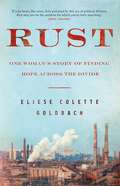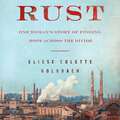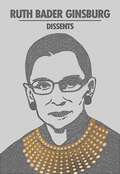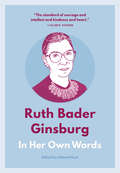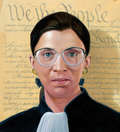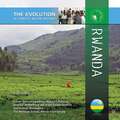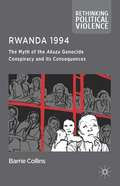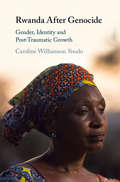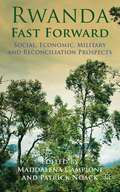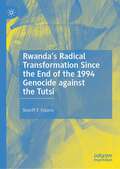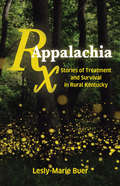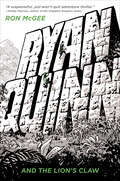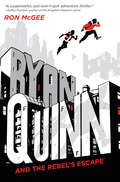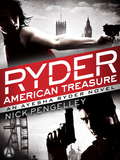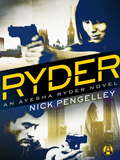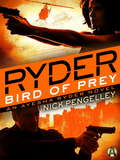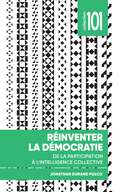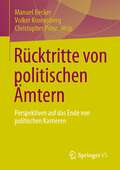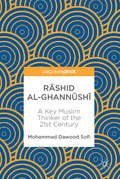- Table View
- List View
Russo-Japanese Relations, 1905-17: From enemies to allies (Routledge Studies in the Modern History of Asia)
by Peter BertonOne surprising outcome of the Russo-Japanese War of 1904–1905 was that, although Russia was humiliatingly defeated, by 1916 Russia and Japan had become allies. This book provides a detailed analysis of how this remarkable turnaround came about. It traces the evolution of relations between the two powers through the conclusion of three public and secret agreements in 1907, 1910, and 1912, and the controversial secret alliance of 1916. The book argues that careful examination of complete records of negotiations from both sides definitively proves the case for Germany, not the United States, as the target of the secret treaty. Based on meticulous examination of documents in both Russian and Japanese foreign policy archives, it charts diplomatic developments, explores how Japanese and Russian thinking evolved, and assesses the wider international impact of the new alliance.
Russophobia: Propaganda in International Politics
by Glenn DiesenThis book defines Russophobia as the irrational fear of Russia, a key theme in the study of propaganda in the West as Russia has throughout history been assigned a diametrically opposite identity as the “Other.” Propaganda is the science of convincing an audience without appealing to reason. The West and Russia have been juxtaposed as Western versus Eastern, European versus Asiatic, civilized versus barbaric, modern versus backward, liberal versus autocratic, and even good versus evil. During the Cold War, ideological dividing lines fell naturally by casting the debate as capitalism versus communism, democracy versus totalitarianism, and Christianity versus atheism. After the Cold War, anti-Russian propaganda aims to filter all political questions through the simplistic binary stereotype of democracy versus authoritarianism, which provides little if any heuristic value to understand the complexities of relations. A key feature of propaganda against the inferior “Other” is both contemptuous derision and panic-stricken fear of the threat to civilization. Russia has therefore throughout history been allowed to play one of two roles—either an apprentice of Western civilization by accepting the subordinate role as the student and political object, or a threat that must be contained or defeated. While propaganda has the positive effect of promoting unity and mobilizing resources toward rational and strategic objectives, it can also have the negative effect of creating irrational decision-making and obstructing a workable peace.
Rust Belt Union Blues: Why Working-Class Voters Are Turning Away from the Democratic Party
by Theda Skocpol Lainey NewmanIn the heyday of American labor, the influence of local unions extended far beyond the workplace. Unions were embedded in tight-knit communities, touching nearly every aspect of the lives of members—mostly men—and their families and neighbors. They conveyed fundamental worldviews, making blue-collar unionists into loyal Democrats who saw the party as on the side of the working man. Today, unions play a much less significant role in American life. In industrial and formerly industrial Rust Belt towns, Republican-leaning groups and outlooks have burgeoned among the kinds of voters who once would have been part of union communities.Lainey Newman and Theda Skocpol provide timely insight into the relationship between the decline of unions and the shift of working-class voters away from Democrats. Drawing on interviews, union newsletters, and ethnographic analysis, they pinpoint the significance of eroding local community ties and identities. Using western Pennsylvania as a case study, Newman and Skocpol argue that union members’ loyalty to Democratic candidates was as much a product of the group identity that unions fostered as it was a response to the Democratic Party’s economic policies. As the social world around organized labor dissipated, conservative institutions like gun clubs, megachurches, and other Republican-leaning groups took its place.Rust Belt Union Blues sheds new light on why so many union members have dramatically changed their party politics. It makes a compelling case that Democrats are unlikely to rebuild credibility in places like western Pennsylvania unless they find new ways to weave themselves into the daily lives of workers and their families.
Rust: A Memoir of Steel and Grit
by Eliese Colette Goldbach"Elements of Tara Westover’s Educated... The mill comes to represent something holy to [Eliese] because it is made not of steel but of people."—New York Times Book ReviewOne woman's story of working in the backbreaking steel industry to rebuild her life—but what she uncovers in the mill is much more than molten metal and grueling working conditions. Under the mill's orange flame she finds hope for the unity of America.Steel is the only thing that shines in the belly of the mill...To ArcelorMittal Steel Eliese is known as #6691: Utility Worker, but this was never her dream. Fresh out of college, eager to leave behind her conservative hometown and come to terms with her Christian roots, Eliese found herself applying for a job at the local steel mill. The mill is everything she was trying to escape, but it's also her only shot at financial security in an economically devastated and forgotten part of America. In Rust, Eliese brings the reader inside the belly of the mill and the middle American upbringing that brought her there in the first place. She takes a long and intimate look at her Rust Belt childhood and struggles to reconcile her desire to leave without turning her back on the people she's come to love. The people she sees as the unsung backbone of our nation. Faced with the financial promise of a steelworker’s paycheck, and the very real danger of working in an environment where a steel coil could crush you at any moment or a vat of molten iron could explode because of a single drop of water, Eliese finds unexpected warmth and camaraderie among the gruff men she labors beside each day.Appealing to readers of Hillbilly Elegy and Educated, Rust is a story of the humanity Eliese discovers in the most unlikely and hellish of places, and the hope that therefore begins to grow.
Rust: One woman's story of finding hope across the divide
by Eliese Colette Goldbach''[a] memoir of modern American industrial life, written by the insider who got away - or got away enough to reflect intelligently on where they came from. Think JD Vance's Hillbilly Elegy and even Tara Westover's Educated . . . We could all learn from her example.' New York Times Book ReviewEliese wasn't supposed to be a steelworker. Raised by staunchly Republican and Catholic parents, Eliese dreamed of escaping Cleveland and achieving greatness in the convent as a nun. Full of promise and burgeoning ideals, she leaves her hometown, but one night her life's course is violently altered. A night that sets her mind reeling and her dreams waning. A cycle of mania and depression sinks in where once there were miracles and prayers, and upon returning home she is diagnosed with mixed-state bipolar disorder.Set on a path she doesn't recognize as her own, Eliese finds herself under the orange flame of Cleveland's notorious steel mill, applying for a job that could be her ticket to regaining stability and salvation. In Rust, Eliese invites the reader inside the belly of the mill. Steel is the only thing that shines amid the molten iron, towering cranes, and churning mills. Dust settles on everything - on forklifts and hard hats, on men with forgotten hopes and lives cut short by harsh working conditions, on a dismissed blue-collar living and on what's left of the American dream.But Eliese discovers solace in the tumultuous world of steel, unearthing a love and a need for her hometown she didn't know existed. This is the story of the humanity Eliese finds in the most unlikely of places and the wisdom that comes from the very things we try to run away from most. A reclamation of roots, Rust is a shining debut memoir of grit and tenacity and the hope that therefore begins to grow.
Rust: One woman's story of finding hope across the divide
by Eliese Colette GoldbachELIESE WASN'T SUPPOSED TO BE A STEELWORKER.Raised by staunchly Republican and Catholic parents, Eliese dreamed of escaping Cleveland and achieving greatness in the convent as a nun. Full of promise and burgeoning ideals, she leaves her hometown, but one night her life's course is violently altered. A night that sets her mind reeling and her dreams waning. A cycle of mania and depression sinks in where once there were miracles and prayers, and upon returning home she is diagnosed with mixed-state bipolar disorder.Set on a path she doesn't recognize as her own, Eliese finds herself under the orange flame of Cleveland's notorious steel mill, applying for a job that could be her ticket to regaining stability and salvation. In Rust, Eliese invites the reader inside the belly of the mill. Steel is the only thing that shines amid the molten iron, towering cranes, and churning mills. Dust settles on everything - on forklifts and hard hats, on men with forgotten hopes and lives cut short by harsh working conditions, on a dismissed blue-collar living and on what's left of the American dream.But Eliese discovers solace in the tumultuous world of steel, unearthing a love and a need for her hometown she didn't know existed. This is the story of the humanity Eliese finds in the most unlikely of places and the wisdom that comes from the very things we try to run away from most. A reclamation of roots, Rust is a shining debut memoir of grit and tenacity and the hope that therefore begins to grow.(P)2020 Macmillan Audio
Rutgers Then and Now: Two Centuries of Campus Development: A Historic and Photographic Odyssey
by Richard L. Edwards David Listokin James W. HughesRutgers University has come a long way since it was granted a royal charter in 1766. As it migrated from a parsonage in Somerville, to the New Brunswick-sited Sign of the Red Lion tavern, to stately Old Queens, and expanded northward along College Avenue, it would both compete and collaborate with the city that surrounded it for room to grow. Rutgers, Then and Now tells this story, proceeding through ten sequential development phases of College Avenue and Piscataway campus expansions—each with its own buildings and physical layouts—that took place over the course of 250 years. It delivers stunning photographic and historic documentation of the growth of the university, showing “what it was and appeared originally” versus “what it is and looks like today.” Among other in-depth analyses, the book compares the diminutive geographic scale of today’s historical College Avenue Campus—once the entirety of Rutgers—to the much larger-sized (in acreage) Busch Campus. Replete with more than 500 images, the book also considers the Rutgers campuses that might have been, examining plans that were changed or abandoned. Shedding light on the sacrifices and gifts that transformed a small college into a vital hub for research and beloved home for students, it explores how Rutgers grew to become a world-class university.
Ruth Bader Ginsburg Dissents (Word Cloud Classics)
by Ruth Bader GinsburgA collection of key dissenting and majority opinions from U.S. Supreme Court justice Ruth Bader Ginsburg.During her 27 years as an associate justice on the U.S. Supreme Court, Ruth Bader Ginsburg became well known for her strongly worded dissenting opinions against the decisions of the conservative majority. Ginsburg was a fierce supporter of women&’s rights whose personal experiences helped shape her into a feminist icon who employed logical, well-presented arguments to show that gender discrimination was harmful to all members of society. Ruth Bader Ginsburg Dissents features 15 legal opinions and briefs, including majority and dissenting opinions that Ginsburg drafted during her time on the U.S. Supreme Court and briefs from her career before she was appointed to the court in 1993.
Ruth Bader Ginsburg: In Her Own Words (In Their Own Words)
by Helena Hunt&“Like so many cultural icons, Ginsberg has doled out some seriously memorable quotes, thoughts, and observations . . . a quick dip of inspiration.&” —Bustle As one of only nine women in a class of 500 at Harvard Law School when she enrolled in 1956 and one of only four female Supreme Court justices in the history of the United States, Ruth Bader Ginsburg was frequently viewed as a feminist trailblazer and an icon for civil rights. Ginsburg had always been known as a prolific writer and speaker. Now, Ruth Bader Ginsburg: In Her Own Words offers a unique look into the mind of one of the world&’s most influential women by collecting 300 of Ginsburg&’s most insightful quotes. Meticulously curated from interviews, speeches, court opinions, dissents, and other sources, Ruth Bader Ginsburg: In Her Own Words creates a comprehensive picture of Ruth Bader Ginsburg, her wisdom, and her legacy. &“The standard of courage and intellect and kindness and heart.&” —Gloria Steinem
Ruth Objects: The Life of Ruth Bader Ginsburg (Big Words)
by Doreen RappaportRuth Bader Ginsburg is a trailblazer. A fighter. And a public servant who has dedicated her life to the pursuit of equality.When Ruth was a young girl, her mother encouraged her to read, be independent, and stand up for what she thought was right. Ruth graduated first in her class at Cornell University and tied for top of her graduating class at Columbia Law School. But she faced prejudice as both a woman and a Jew, making it difficult to get a job. Ruth eventually found work as a law clerk, and her determination, diligence, and skill led to a distinguished career as a lawyer. In 1993, she became the second woman ever appointed to the United States Supreme Court. As a Supreme Court justice, Ruth has inspired fierce admiration and faced fervent opposition for her judgments in high-profile cases, many of which have involved discrimination. She has been lauded for her sharp wit and boldness, even when her opinions differ from that of the majority.As a student, teacher, lawyer, and judge, Ruth often experienced unfair treatment. But she persisted, becoming a cultural icon, championing equality in pay and opportunity. Her brilliant mind, compelling arguments, and staunch commitment to truth and justice have convinced many to stand with her, and her fight continues to this day.This installment of the award-winning Big Words series brings a legendary figure into focus with Doreen Rappaport's incisive prose combined with Ruth's own words. Eric Velasquez's dynamic illustrations infuse every scene with life in a moving tribute that will inspire young justice seekers everywhere.
Rutherford B. Hayes: Nineteenth President of the United States
by Neal E. RobbinsFollows the life of Rutherford B. Hayes, including his childhood, education, employment, political career, and term of presidency.
Rwanda (The Evolution of Africa's Major Nations)
by Andy KoopmansEven before the country became independent in 1962, Rwanda's two largest ethnic groups, the Hutu and Tutsi, were often at war. In the spring of 1994, tensions between the two groups culminated in nationwide massacres of approximately 800,000 Tutsi and moderate Hutu. The genocide drew international attention to the problems of this small state in central Africa. Since the genocide ended, Rwanda has made slow but steady progress. In 2003, a new constitution was adopted that would prevent future human-rights abuses. The country's economy, devastated by years of civil war, is also improving. However, much work must still be done to ensure Rwanda's stability.
Rwanda 1994
by Barrie CollinsThrough a rigorous critique of the dominant narrative of the Rwandan genocide, Collins provides an alternative argument to the debate situating the killings within a historically-specific context and drawing out a dynamic interplay between national and international actors.
Rwanda After Genocide: Gender, Identity and Post-Traumatic Growth
by Caroline Williamson SinaloIn the 1994 Rwanda genocide, around 1 million people were brutally murdered in just thirteen weeks. This book offers an in-depth study of posttraumatic growth in the testimonies of the men and women who survived, highlighting the ways in which they were able to build a new, and often enhanced, way of life. In so doing, Caroline Williamson Sinalo advocates a new reading of trauma: one that recognises not just the negative, but also the positive responses to traumatic experiences. Through an analysis of testimonies recorded in Kinyarwanda by the Genocide Archive of Rwanda, the book focuses particularly on the relationship between posttraumatic growth and gender and examines it within the wider frames of colonialism and traditional cultural practices. Offering a striking alternative to dominant paradigms on trauma, the book reveals that, notwithstanding the countless tales of horror, pain, and loss in Rwanda, there are also stories of strength, recovery, and growth.
Rwanda Fast Forward
by Maddalena Campioni Patrick NoackThe authors explore the outlook of Rwanda in the context of development of East Africa and Sub-Saharan Africa. They examine Rwanda's vision, achievements and uncertainties in terms of national unity, institutional leadership, the spectre of industrial policy and economic development, perceptions of civil society engagement, etc
Rwanda’s Radical Transformation Since the End of the 1994 Genocide against the Tutsi
by Sheriff F. FolarinThis book discusses the radical transformation of Rwanda, focusing on the dynamics of its society before and after the genocide against theTutsis in 1994. Through contextualizing the significant changes experienced by the country, it throws searchlights on a number of other African states facing similar challenges. The author analyses Rwanda's challenges of nationhood after the genocide; the vision and will of the country’s leadership; its social programs and strategies for cohesion and national development; the population’s resilience; and its growing regional influence in the twenty-first century. Rwandan society is here considered not only through the lens of existing literature on African politics, but also through direct engagement and fieldwork with local populations, scholars and policymakers. In addition, the book weighs in on narratives of survivors and victims of the genocide to understand and present local dispositions to current realities such as reforms, development plans, inclusive policies and programs, and determine how Rwandans deal with historical identity issues and conflicts. This book will be of interest to students, scholars and researchers interested in Rwandan and African politics, peace and conflict studies, security (strategic) studies, and genocide studies.
Rx Appalachia: Stories of Treatment and Survival in Rural Kentucky
by Lesly-Marie Buer&“Riveting . . . A necessary book for those seeking to understand the opioid crisis and the broader political economy of which it is part.&” —Jessica Wilkerson, author of To Live Here, You Have to Fight Prescription opioids are associated with rising rates of overdose deaths and hepatitis C and HIV infection in the US, including in rural Central Appalachia. Yet, despite extensive media attention, there is a dearth of studies examining rural opioid use. Challenging popular understandings of Appalachia spread by such pundits as JD Vance, Rx Appalachia documents how women, families, and communities cope with generational systems of oppression. Using the narratives of women who use or have used drugs, RX Appalachia explores the gendered inequalities that situate women&’s encounters with substance abuse treatment as well as additional state interventions targeted at them in one of the most impoverished regions in the United States.
Ryan Quinn and the Lion's Claw (Ryan Quinn Ser. #2)
by Ron McGee“A suspenseful, just-won’t-quit adventure thriller.” —Ridley Pearson, author of the Kingdom Keepers seriesRyan Quinn and the Lion’s Claw is the much-awaited sequel in the thrilling series about Ryan Quinn, a New York City teenager who would give James Bond and Jason Bourne a run for their money. Ryan Quinn has never been a normal kid, and after everything that happened in Andakar, he’s about as far away from normal as could be. His parents want him to forget all about his death-defying escape, his role in the Emergency Rescue Committee, and the fact that they’ve been keeping secrets from him his whole life. But forgetting just isn’t an option for Ryan—not when there’s a traitor in the ERC who’s looking to ruin Ryan’s parents and expose the whole organization.Unsure where to turn or who to trust, Ryan and his friends Danny and Kasey soon find themselves on another adventure, across the world, to help a musician whose words have started a revolution. It’s a globe-trotting mission more treacherous than Ryan could have ever imagined. And just when he feels like he’s cracked the final clue, Ryan stumbles across the biggest secret of all—and it’s about him.Fans of Alex Rider and Spy School will be completely enthralled by the second book in Ron McGee’s high-stakes Ryan Quinn series.
Ryan Quinn and the Rebel's Escape
by Ron Mcgee Chris SamneeRyan Quinn and the Rebel's Escape is the first fast-paced, sensational novel in a trilogy about a New York City teenager who could give James Bond and Jason Bourne a run for their money. Fans of Alex Rider and the Spy School series will be completely enthralled.Ryan Quinn hopes his traveling days are over. The son of a United Nations worker, he's grown up in Europe, the Middle East, Asia, Africa--everywhere but home. He's finally settled at a great school in New York and is making friends when, suddenly, his world is turned upside down.Ryan is blindsided when his father disappears and his mother is abducted. Left with nothing but questions, he soon discovers his parents have been leading a double life. They actually work with the Emergency Rescue Committee, an underground organization that has performed dangerous rescue missions since World War II, and they've been secretly training Ryan to follow in their footsteps.With his parents' lives in the balance and more at stake than he knows, Ryan dives into a mission of international intrigue that sends him around the globe. To survive, he must trust his training and perform his own daring rescue mission in a thrilling race for freedom.Don't miss this first book in Ron McGee's high-stakes trilogy about Ryan Quinn.
Ryder: American Treasure
by Nick PengelleyFast-paced, edgy, and action-packed, the perfect read for anyone who loves the novels of Steve Berry or James Rollins, Ryder: American Treasure marks the return of Ayesha Ryder, a woman digging into history's most dangerous secrets--and hiding some of her own. During of the War of 1812, British troops ransacked the White House and made off with valuables that were never returned. Two centuries later, a British curator finds a vital clue to the long-vanished loot. Within hours, the curator is assassinated--and Ayesha Ryder, a Palestinian-born antiquities expert, is expertly framed for his murder. Who could be behind such a conspiracy? And why do they want Ryder out of the way? To find out, she picks up a trail leading from a mysterious nineteenth-century letter to the upcoming presidential election. As Ryder dodges killers in the shadow of hidden alliances, sexual blackmail, and international power plays, she finds that all roads lead to the Middle East, where a fragile peace agreement threatens to unravel . . . and another mystery begs to be discovered. Ryder's rarefied academic career and her violent past are about to collide. And her only hope of survival is to confront a powerful secret agent who has been waiting for one thing: the chance to kill Ayesha Ryder with his own two hands.Praise for Ryder "[Nick] Pengelley sets an unconventional story loose on and below the streets of London. With his unusual heroine, the author rejects the clichés of action-adventure thrillers and delivers a surprisingly entertaining read."--Library Journal (starred review) "An exciting thriller with characters that you can't help but like . . . a thrill-a-minute story . . . well worth reading . . . Pengelley has a hit with the character of Ayesha Ryder."--Fresh Fiction "This fast-paced crime/political thriller not only is timely for today's Israeli-Palestinian conflicts, but it delves into historical events that helped shape the way the region's political climate has evolved. . . . Get ready for an edge-of-your-seat ride featuring a kick-butt heroine bent on justice . . . I had a blast reading Ryder."--Popcorn Reads "An Indiana Jones-type adventure . . . Ryder has an Angelina Jolie-esque quality about her. . . . She is strong, both mentally and physically, and she was an amazing character to read. . . . [Ryder is] a literary roller-coaster ride I truly appreciated!"--Read-Love-Blog
Ryder: An Ayesha Ryder Novel (Ayesha Ryder #1)
by Nick PengelleyNAMED ONE OF THE BEST BOOKS OF THE YEAR BY LIBRARY JOURNALAyesha Ryder bears the scars of strife in the Middle East. Now her past is catching up to her as she races to unravel a mystery that spans centuries--and threatens to change the course of history. As Israeli and Palestinian leaders prepare to make a joint announcement at the Tower of London, an influential scholar is tortured and murdered in his well-appointed home in St. John's Wood. Academic researcher Ayesha Ryder believes the killing is no coincidence. Sir Evelyn Montagu had unearthed shocking revelations about T. E. Lawrence--the famed Lawrence of Arabia. Could Montagu have been targeted because of his discoveries? Ryder's search for answers takes her back to her old life in the Middle East and into a lion's den of killers and traitors. As she draws the attention of agents from both sides of the conflict, including detectives from Scotland Yard and MI5, Ryder stumbles deeper into Lawrence's secrets, an astounding case of royal blackmail, even the search for the Bible's lost Ark of the Covenant. Every step of the way, the endgame grows more terrifying. But when an attack rocks London, the real players show their hand--and Ayesha Ryder is left holding the final piece of the puzzle.Praise for Ryder "[Nick] Pengelley sets an unconventional story loose on and below the streets of London. With his unusual heroine, the author rejects the clichés of action-adventure thrillers and delivers a surprisingly entertaining read."--Library Journal (starred review) "An exciting thriller with characters that you can't help but like . . . a thrill-a-minute story . . . well worth reading . . . Pengelley has a hit with the character of Ayesha Ryder."--Fresh Fiction "This fast-paced crime/political thriller not only is timely for today's Israeli-Palestinian conflicts but it delves into historical events that helped shape the way the region's political climate has evolved. . . . Get ready for an edge-of-your-seat ride featuring a kick-butt heroine bent on justice . . . I had a blast reading Ryder."--Popcorn Reads"An Indiana Jones-type adventure . . . Ryder has an Angelina Jolie-esque quality about her. . . . She is strong, both mentally and physically, and she was an amazing character to read. . . . [Ryder is] a literary roller-coaster ride I truly appreciated!"--Read-Love-Blog
Ryder: Bird of Prey
by Nick PengelleyFans of Steve Berry and James Rollins will devour Ryder: Bird of Prey, the latest white-knuckle thriller featuring Palestinian-born, British-educated adventurer Ayesha Ryder. She's one of fiction's boldest heroines--and now she's rewriting royal history. According to the last words of a dying man, the Maltese Falcon was no mere legend: The fabulously jeweled golden bird really existed--still exists, in fact. And Ayesha Ryder is hot on its trail. Rumor says the Falcon conceals clues to the burial place of Harold II, the conquered Anglo-Saxon King of England--and to an artifact of astonishing significance that few besides Ryder would understand. Hunted by Scotland Yard, MI5, and those who seek the Falcon to break up the United Kingdom, Ryder joins forces with Joram Tate, a mysterious librarian with a reputation for turning up things that don't want to be found. Soon Ryder and her handsome, erudite new companion are venturing through lost tombs and ancient abbeys, following a trail left ages ago by the Knights Templar. Ryder knows she's close to a game-changing secret, hidden for a thousand years beneath an English castle. But with ruthless killers waiting in the wings, Ryder must go medieval--to defend her life, her country, and the world as we know it. Praise for Ryder "[Nick] Pengelley sets an unconventional story loose on and below the streets of London. With his unusual heroine, the author rejects the clichés of action-adventure thrillers and delivers a surprisingly entertaining read."--Library Journal (starred review) "An exciting thriller with characters that you can't help but like . . . a thrill-a-minute story . . . well worth reading . . . Pengelley has a hit with the character of Ayesha Ryder."--Fresh Fiction"This fast-paced crime/political thriller not only is timely for today's Israeli-Palestinian conflicts, but it delves into historical events that helped shape the way the region's political climate has evolved. . . . Get ready for an edge-of-your-seat ride featuring a kick-butt heroine bent on justice . . . I had a blast reading Ryder."--Popcorn Reads "An Indiana Jones-type adventure . . . Ryder has an Angelina Jolie-esque quality about her. . . . She is strong, both mentally and physically, and she was an amazing character to read. . . . [Ryder is] a literary roller-coaster ride I truly appreciated!"--Read-Love-Blog
Réinventer la démocratie: De la participation à l’intelligence collective (Collection 101)
by Jonathan Durand FolcoAs socioeconomic inequality rises, trust in institutions declines, authoritarian populist movements emerge, misinformation spreads more rapidly and online debates become more polarized, democracy is faced with multiple crises. Are we witnessing the end of democracy? Réinventer la démocratie explores the idea that the political system is in the midst of a major crisis, but one which provides the perfect opportunity to examine the origins of the democratic ideal. At the local democratic level—more specifically at the municipal institution level—we can experiment with innovative forms of public deliberation, civic engagement, and collective intelligence.Following an analysis of the origins of and current crises facing democracy, Jonathan Durand Folco outlines some possible solutions using institutional innovations, strategies, and new practices that can be implemented at the local level. Due primarily to their proximity, municipalities are the perfect place for doing democratic experiments, resolving concrete problems, and potentially incorporating collective intelligence. The author offers a critical analysis of various local participatory mechanisms and finally addresses the question of the “virtues” that can be deployed to strengthen the primary tenets of democracy—engagement, deliberation, representation, inclusion, and collective intelligence. Rather than dwell on the intricacies of today’s society, this book acts instead as a compass to illuminate the paths of democratic emancipation.
Rücktritte von politischen Ämtern: Perspektiven auf das Ende von politischen Karrieren
by Volker Kronenberg Manuel Becker Christopher PrinzPolitikwissenschaftliche und zeitgeschichtliche Untersuchungen zu den Karrieren deutscher Spitzenpolitiker*innen beschäftigten sich bislang vor allem mit deren Aufstieg und weniger mit dem Ende von politischen Laufbahnen. Aus welchen Gründen treten Politiker*innen aus dem Amt zurück? Was sind die Hintergründe, Motive und Konsequenzen einer solchen Entscheidung? Müssen Rücktritte zwingend Resultat eines Scheiterns sein oder kann es auch „erfolgreiche“ Rücktritte geben? In diesem Band werden theoretische Grundlagen der Rücktrittsforschung aus rechtlicher und politikwissenschaftlicher Perspektive erarbeitet, Rücktrittskulturen in unterschiedlichen Ländern vergleichend untersucht sowie verschiedene Fallbeispiele in ihren spezifischen Einzelfallbedingungen unter die Lupe genommen.
Rāshid al-Ghannūshi̇̄: A Key Muslim Thinker of the 21st Century
by Mohammad Dawood SofiThis book discusses various dynamic facets of the life of Rāshid al-Ghannūshi̇̄, a distinguished Islamic thinker and activist not only in Tunisia and North Africa, but in the entire Muslim world. It especially focuses on those aspects related to his intellectual understanding and response to a number of critical contemporary issues. In the 21st Century, Rāshid al-Ghannūshi̇̄ is considered as the most moderate among the Muslim thinkers and intellectuals, particularly when it comes to the question of Islam-democracy compatibility and power sharing theory. This book also offers an account of a previously little known, yet much talked about Muslim voice in the post-Arab Spring era. It further shows how the intellectual Muslim thinkers’ own perspectives and expectations from Islamic movement(s) and their interaction with the ‘western oriented local leadership’, as well as their (secular) policies color their understanding of Islam and various other major issues.
